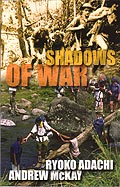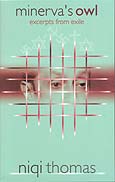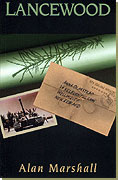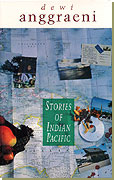
Stories of Indian Pacific are three novellas, set in New Caledonia, Australia and Indonesia, written in Dewi Anggraeni’s engaging style that moves easily from one location to the next.
To Drown a Cat explores racial tension in New Caledonia; Uncertain Step is the story of an Indonesian bride in Australia; and in Crossroads two artists, an Australian and an Indonesian, meet in Bali.
To Drown a Cat is set in 1988, shortly after the violent confrontation between the French army and Kanak separists in the northern island of Ouvea. The story explores the tensions that explode in bloody confrontation, within a family divided by allegience to two sets of ancestors, the French Caldoche and the indigenous Kanak.
Uncertain Step tells the story of Aryani, and her relatively late marriage to Steve, an Australian teacher who already has two children, and is still good friends with his previous wife. Aryani finds the Australian scenery, Steve’s hometown, Adelaide and people’s response to herself very different from everything she is used to in Bandung. Her uncertain step into marriage with this warm but almost unknown Australian is the story of so many Asian brides and their Australian husbands.
In Crossroads, the young Australian rock singer, Justin is introduced to a new world of art and life, when he meets the Balinese poet and playwright, Nyoman. Justin sees for the first time, art as close to nature and art as important for political and social change.
Oct 1992, 265pp
Paperback, 215 x 138 mm
ISBN 0 9587718 3 9
RRP $aud 18.95
Fiction 1st edition
ISBN-13 978
The AuthorAs a published writer of novels, short stories and essays, and an established role as a regional journalist, Dewi Anggraeni is well-known in both Australia and Indonesia, especially among those in both countries who maintain an interest in regional affairs.
Her major works have been published by Indra Publishing:Who Did This To Our Bali?, 2003
Snake, 2003
Neighbourhood Tales: A Bilingual Collection, 2001
Journeys Through Shadows, 1998
Stories of Indian Pacific, 1992
Parallel Forces, 1988
The Root of all Evil, 1987
Dewi’s poetry, short stories and essays appear in anthologies from a range of publishers:
“Journey to My Cultural Home” in Weaving a Double Cloth; Stories of Asia Pacific Women in Australia (Ed. Myra Jean Bourke, Susanne Holzknecht and Annie Bartlett, Pandanus Books, 2002)
“Exposing Crimes Against Women” in The Last Days of President Suharto (Ed. Edward Aspinall, Herb Feith and Gerry van Klinken, Monash Asia Institute, 1999)
“Rejected by Ibu Pertiwi” in Motherlode (Ed. Stephanie Holt and Maryanne Lynch, Sybylla Feminist Press, 1997)
“From Indonesia to Australia and Back: Cultural Sensitivities” in Crossing Cultures: Essays on Literature & Culture of the Asia-Pacific (Ed.Bruce Bennett, Jeff Doyle, Satendra Nandan, Skoob Books, 1996)
“Illegal” in Our Heritage (Ed. Satyagraha Hoerip, Pustaka Binaman Pressindo, 1993)
“Irritations” in Striking Chords (Ed. Sneja Gunew and Kateryna O Longley, Allen & Unwin, 1992)
“Mal Tombé” in Beyond the Echo (Ed. Sneja Gunew and Jan Mahyuddin UQP, 1988)”A Foreigner in East Gippsland” in Up From Below (Women’s Redress Press Inc., 1987)
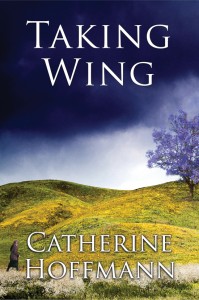 The third volume of Catherine Hoffmann’s Lia Mendez trilogy is now available as an ebook. Find it on Amazon for $(US)4.99 a copy or the equivalent price in your own currency on your national Amazon site.
The third volume of Catherine Hoffmann’s Lia Mendez trilogy is now available as an ebook. Find it on Amazon for $(US)4.99 a copy or the equivalent price in your own currency on your national Amazon site.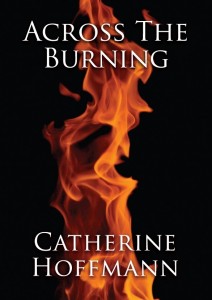
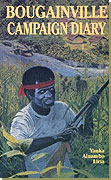 The revealing journal of an ex-Papua New Guinea Defence Force Officer, detailing against the historical background, the inside story of military operations against the Bougainville Revolutionary Army (BRA).
The revealing journal of an ex-Papua New Guinea Defence Force Officer, detailing against the historical background, the inside story of military operations against the Bougainville Revolutionary Army (BRA).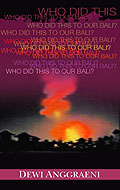 On October 12, 2002, Bali seemed to crumble overnight, when hundreds of tourists and locals who were enjoying themselves became victims of two horrific bomb blasts. The bombs took the lives of 202 people – 88 of whom were Australians, and severely injured many more.
On October 12, 2002, Bali seemed to crumble overnight, when hundreds of tourists and locals who were enjoying themselves became victims of two horrific bomb blasts. The bombs took the lives of 202 people – 88 of whom were Australians, and severely injured many more.
